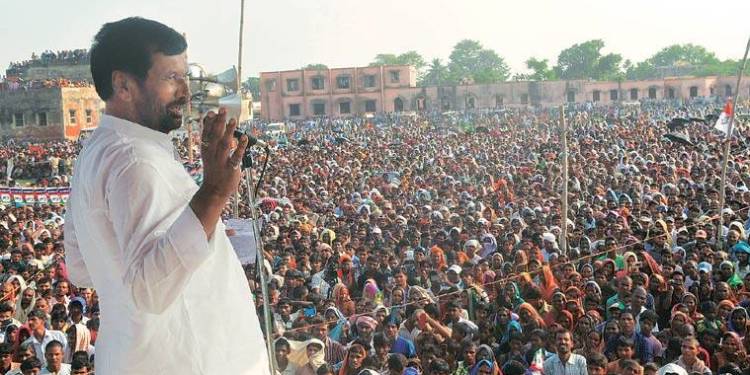Ram Vilas Paswan, who set a record by working with six Prime Ministers of the country, passed away a few weeks before the Bihar elections. If he had lived for a few more years, it might have been possible for him to see son, Chirag Paswan, as the chief minister of the third most populous state of the country.
Paswan was a kind of politician who could only emerge and remain relevant in a country like India. In a political career spanning more than five decades, he worked with socialists, Communists, Nationalists, Capitalists, Lohiaites and many others. He mixed with almost every ideology while keeping his political and vote base intact.
The biggest strength of Ram Vilas Paswan was that he knew his limitations. He never enjoyed a state-wide or nation-wide popularity, and therefore, instead of racing alone, he mastered the art of coalition politics. Lalu Yadav used to call him mausam vaigyanik out of frustration as well as admiration, because Paswan had a nose for the winning side. He was probably best psephologist of the country without any experience in the field. He could sense the political wind better than the ideologically driven pollsters in Delhi’s boardrooms.
Paswan started political career in early 70s- like all the Bihar’s politician of the last generation including Lalu Yadav, Nitish Kumar, Sushil Modi- and became a minister for the first time in VP Singh’s Janata Dal government of 1989 in which he was labour and welfare minister. He won the Lok Sabha election for the first time in 1977 when Congress was uprooted from the power for the first time and won in 1980 again despite Indira wave. However, he lost in 1984 when Congress swept the entire country after the assassination of Indira Gandhi. But Paswan was elected in 1989 again and became a minister.
In 1991 general election, which was also a wave election amid assassination of Rajiv Gandhi and Congress once again swept North India and most of popular non-Congress leaders were thrown out of parliament, Paswan changed the seat from Hajipur to Rosera and emerged victorious. And this was the uniqueness of Paswan, he always played smart and emerged victorious.
In 1996, he again fought from traditional bastion Hajipur, got elected, and became a minister in the United Front government (1996-1998). After that, he allied with BJP, switching from life-long secular and socialist politics to allying with a so called communal and capitalist party. A person whose politics revolved around social justice and socialism has no hesitation in allying with what was then popularly known as Brahmin-Bania party.
After that, in 2002 he left BJP led alliance as well as Janata Dal to form his own party, LJP. In 2004, he allied with Congress and became a minister in UPA government. In the state politics, he played a crucial role in the ouster of Lalu Yadav from power by not supporting RJD in 2005 election when no party or coalition had a clear majority. Bihar went to election once again and Nitish Kumar was elected as CM with the help BJP and this marked the end of Bihar’s 15 years of Jungle-raj.
In 2014, Paswan allied with BJP and became a minister in the Modi government despite his scathing criticism of Modi when he was CM of Gujarat. When it came to coalition, Paswan was always ready to put the past behind.
Now, as Paswan is no more, his son, Chirag Paswan, is playing very smart coalition politics just like his father. At centre he is with NDA but in Bihar he is fighting against Nitish Kumar to capitalize on 15 years of anti-incumbency. One of the better dynasts of the country, Chirag Paswan might take the legacy of the family forward by becoming a successful politician just like his father.
